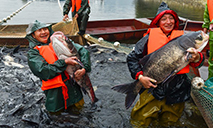Yearender: China's vaccine donations, co-productions light up hope of winning fight against COVID-19 in Mideast
CAIRO, Dec. 24 (Xinhua) -- As the COVID-19 pandemic continued to rage in the Middle East in 2021, China was the only big power that provided generous vaccine donations and even helped localize vaccine production, lighting up the hope of defeating the pandemic in the region.
China donated and exported a large quantity of COVID-19 vaccines to Middle East countries in dire need of them, at a time when Western countries largely stockpiled vaccines for their own good.
In Egypt, Algeria and the United Arab Emirates (UAE), China created joint ventures to produce the COVID-19 vaccines in order to meet the local demand.
The vaccine cooperation between China and Middle East countries, which helped stabilize the epidemic situation in the region, has sublimated their friendship, deepened mutual trust, and opened up new areas of cooperation.
FRIENDS IN NEED
Following a year of mutual help and cooperation in fighting the COVID-19 in 2020, the vaccine cooperation between China and Middle East countries in 2021 further demonstrated that they are true friends in need.
Many countries in the region rushed to help China by sending medical aid or messages of solidarity in early 2020 at the pandemic's outbreak. China returned favor by offering medical aid and dispatching medical experts to help these countries in their fight against the contagious disease.
The anti-pandemic cooperation continued in 2021, mainly in the form of China's donating the much-needed COVID-19 vaccines for the Middle East countries.
On Jan. 14, Turkey became the first country in the region to start a mass vaccination drive, thanks to the arrival of 3 million doses of China's Sinovac vaccine. To date, more than 127 million doses have been administered in Turkey, playing an important role in the control of the pandemic in the country.
Morocco started its nationwide vaccination campaign on Jan. 28 following the arrival of China's Sinopharm vaccines. Many other countries in the Middle East, including Egypt, Iraq, Sudan, Algeria, Jordan, Tunisia, Lebanon, Palestine, Sudan, Iran and Syria, and the pan-Arab group Arab League also received vaccines donated from China.
By the end of July, China had exported more than 72 million doses of vaccine to 17 Arab countries and the Arab League, official statistics show.
To a large extent, China helped bridge the immunity gap with its generosity, which stood in stark contrast to the U.S.-led Western countries.
"China has improved its image in the MENA (the Middle East and North Africa) region, especially relative to Western countries. Not only has it been perceived as more supportive but also more effective in dealing with the pandemic," Naser al-Tamimi, a Britain-based Middle East analyst, told the press in July.
VOTE OF CONFIDENCE
In addition to the vaccine donations and exports, China helped localize the production of the COVID-19 vaccines in the Middle East, with an aim to achieve the goal of vaccine self-sufficiency in the region.
On March 28, the UAE became the first country in the Middle East to start manufacturing a COVID-19 vaccine named Hayat-Vax at a joint venture between China's biopharmaceutical giant Sinopharm and the Abu Dhabi-based technology company Group 42 (G42), with a production capacity of 200 million doses a year.
In April, Egyptian Holding Company for Biological Products and Vaccines (VACSERA) inked a deal with the Chinese biopharmaceutical company Sinovac Biotech on creating a joint venture with a capacity of producing 2 million doses of vaccine per week. On July 18, the venture celebrated the production of the first 1 million doses of Sinovac vaccine.
On Sept. 29, Algeria inaugurated a joint venture in the eastern province of Constantine, which was created by Algeria's pharmaceutical group Saidal with Sinovac to produce the COVID-19 vaccines. It aims to manufacture 6 million doses of Sinovac vaccine by the end of this year, and 96 million doses each year thereafter.
Countries in the Middle East embraced China's vaccines, giving a vote of confidence in their safety and efficacy.
In January, Turkish President Recep Tayyip Erdogan received the Sinovac vaccine shot, giving a strong push to Turkey's national vaccination campaign.
In terms of immunization efficacy, the UAE revealed in late 2020 that interim analysis of phase III studies showed the Sinopharm vaccine to be 86 percent effective, while Turkey announced on March 5 that the Sinovac vaccine had an efficacy of 83.5 percent against COVID-19.
"Vaccines are the only hope to curb and control the spread of the virus," said Magdy Badran, a professor of virology and member of the Egyptian Association of Immunology, adding the most important thing is that the Chinese vaccines are safe, effective, cheap and available.
"I am deeply impressed by China's proposal of building a global community of health for all, as the virus does not differentiate between the poor and rich, or developed and developing countries," said Badran.
"China has already made tremendous contributions to the global effort through the rapid development of a number of vaccines, and through sharing those vaccines globally," said Richard Hatchett, CEO of the Coalition for Epidemic Preparedness Innovations, a global vaccine partnership.
POSITIVE IMPACT
In addition to the previous business areas, those countries that partner with China in the production of vaccines have expanded bilateral cooperation to other domains including medical and pharmaceutical science.
The UAE, Bahrain, Jordan, Saudi Arabia and Turkey participated in the Chinese vaccine's phase III clinical trials, and gained not only health benefits but also economic ones via vaccine cooperation with China.
High vaccination rates have drawn many foreigners to return to work or vacation in these countries.
Cooperation with China in vaccine research and production also allows Middle East countries like the UAE to diversify their economies beyond the oil business.
Photos
Related Stories
- Hong Kong reports 7 more cases of Omicron COVID-19 variant
- 26 punished for COVID-19 resurgence in China's Xi'an
- China highlights COVID-19 control during holidays
- Human rights hell on earth: US repeatedly botches response to COVID-19
- China's Xi'an imposes lockdown amid COVID-19 resurgence
- Spirit of community with shared future a lodestar for bewildered world of 2021
- Harbin downgraded to low-risk category for COVID-19
- China's Shaanxi reports 149 COVID-19 cases
- Hong Kong reports 7 more cases of Omicron COVID-19 variant
- Mix of challenges, hope in 2021 COVID-19 fight
Copyright © 2021 People's Daily Online. All Rights Reserved.










